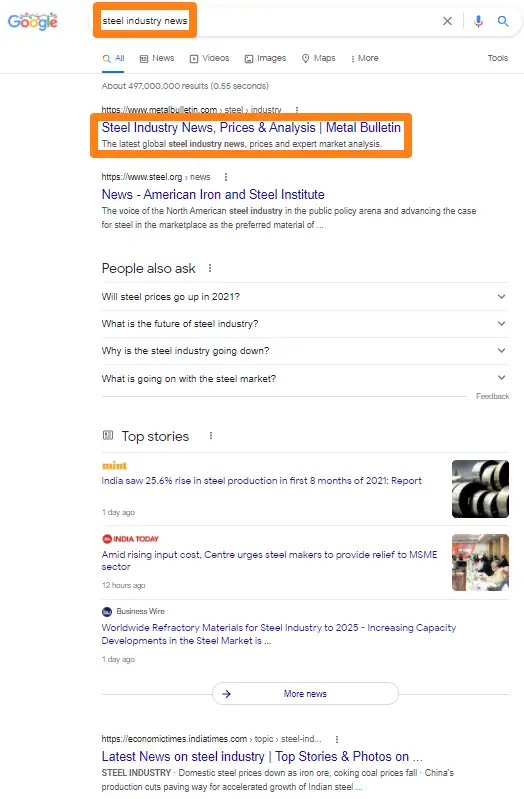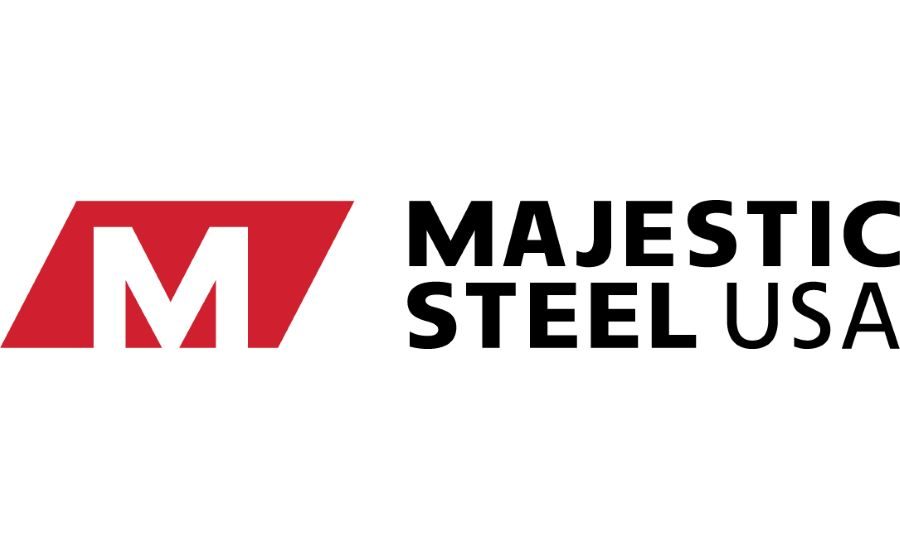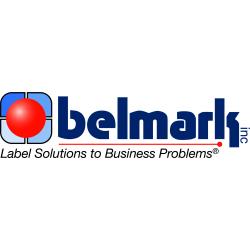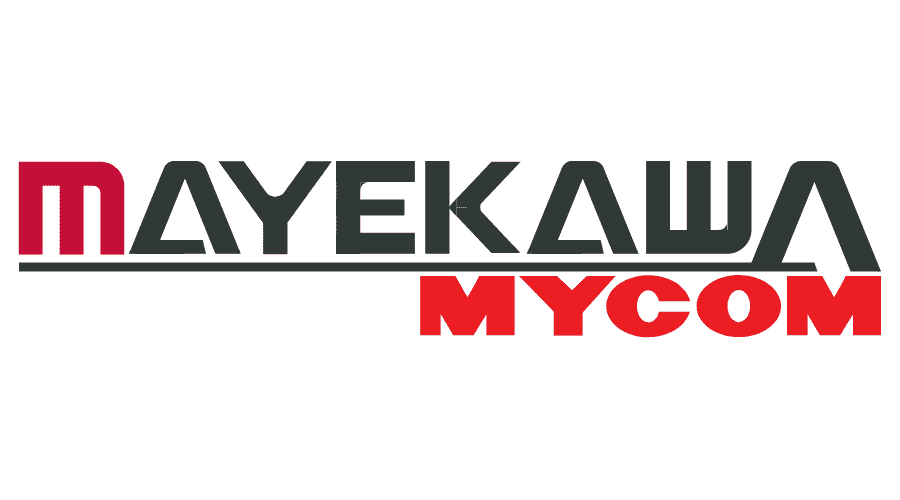
With today’s Google-dominated internet, SEO is a necessity for any business to stay relevant. SEO for manufacturing and industrial companies is no exception. When procurement specialists and executives need products and services, where do you think they look? They do research online, and they’re likely only to visit pages in the top results of Google.
If your website isn’t optimized for SEO, you’ll get lost in the mix.
That’s why you need to adopt an SEO strategy for your manufacturing or industrial company. You’ll increase your visibility among engineers, operations, executives, and other decision makers.
Whether your pain point is that you’re short-staffed or you need more leads/revenue, higher visibility for your website can help you find additional staff and attract more qualified leads. SEO can help your prospects find the best of the best.
Which Section Do You Want to Read First?
How Does SEO Work Now & How Valuable Is It to Manufacturers & Industrial Companies?
SEO is a different ball game than it was a few years ago.
It’s evolved way beyond the simple use of keywords. It’s now a way more complex and technical process that involves:
- Detailed and strategic planning
- UX (user experience) metrics (dwell time, bounce rate, etc.)
- Optimize existing pages that are on the verge of lots more traffic (striking distance)
- Quality backlinks to pages you are trying to rank
- Long term focus (outsized results take 12+ months)
- Releasing relevant and engaging content
- And much, much more
But all is not lost; it’s no reason to be overwhelmed. I’ve compiled the ultimate guide to SEO for industrial/manufacturing companies. Stay tuned to discover the 7 essential benefits you’ll enjoy from implementing SEO for your company. Also, you’ll learn 9 pro tips to help you find success in those efforts.
SEO Success of Our Manufacturing & Industrial Clients
Through the digital marketing strategy (SEO, digital ads, email, website, etc.) I’ve provided a number of manufacturing and industrial companies, these clients have seen growth in quality leads and sales.
7 Benefits of Using SEO for Manufacturing & Industrial Companies
If you’re on the fence about whether SEO will work for your industrial or manufacturing company, these benefits should change your mind. You’ll enjoy a myriad of perks by optimizing your website for search engines.
These 7 are some of the most prevalent, but there are many more benefits you’ll enjoy. SEO can help you attract new qualified prospects, increase revenue, generate more awareness, build brand loyalty, find more workers, and much more.
1. SEO Provides a Long-Term ROI

Are you not sure if you are getting an ROI on your digital or traditional ads? Why not invest those funds into a solid SEO strategy instead?
You’ll enjoy a long-term return on investment for your SEO efforts if done right. That makes it more effective than more traditional forms of advertising.
Once your website rankings rise and your traffic increases, you can spend less on paid media, and you will get a return for months and years to come.
SEO can indeed take a while to gain traction. That’s why it’s a long-term investment. Yet, once you start to see growth, it’s exponential. In general, it takes around 6-9 months (after publishing changes) for SEO tactics to start showing some results. And 12+ months to see the full benefit…
2. A Consistent Increase in Web Traffic
Organic web traffic is what drives new customers to your business. The more eyeballs that you can get looking at your website, the better. Using SEO is a tried and true way to increase your traffic exponentially. SEO for manufacturing companies is no different.
If you have a fully optimized strategy in place, you’ll see lots of new traffic.
That’s why it’s so crucial to create quality content that answers user questions. Blog articles optimized for targeted keywords will help you generate new traffic. If you have a decent conversion rate on your website, you’ll see increased revenue too.
3. Become a True Thought Leader

The ability to become a thought leader is one of the most significant benefits of SEO for manufacturing. As you continue to gain traction, customers will start to take notice. You’ll increase your brand awareness and solidify yourself as a thought leader for your industry.
That will only intensify as you consistently beat out your competitors in the search results.
If you’ve been looking for a way to spread awareness for your brand, SEO is a great option. You’ll build customer loyalty while promoting your business at the same time. Once you crack the top 5 spots on page 1 of Google often enough, you’ll be seen as a proper authority and guru in your industry.
Discover Our Manufacturing-Tailored SEO Consulting Services

4. More Access to Quality Sales Leads

Is your sales team hungry for some quality leads? Then using SEO is an ideal solution. As your website rises through the ranks, you’ll naturally gain more sales leads.
It’s crucial to make sure that your website has a decent conversion rate.
Otherwise, the traffic that you gain won’t amount to much…it’s all about quality over quantity.
That’s where a sales funnel comes into the picture. If you set up a funnel for your landing pages, you’ll increase your conversion rate. That can help you catch on to those sweet, sweet leads for your sales team. Here’s a detailed breakdown of how you can leverage your SEO for sales leads.
5. Tracking Customer Behavior and Market Trends
An industrial or manufacturing SEO agency can help you do a lot more than generate traffic. In fact, SEO is a great way to track customer behavior and market trends. Here are some essential tools you can use to track your progress:
With these tools, you can know about trending topics, what customers are looking for the most, and more. That’s all valuable information for your business. You’ll be able to understand your target audience’s shopping patterns, which can help you keep hot items in stock at crucial times.
It’s crucial to track the searching behavior of your target audience as well. If your niche is extremely broad, such as ‘happiness’, then you need to narrow things down a bit.
Try to be as specific as possible when selecting keywords. A variation of happiness could be ‘feeling comfortable in your own skin.’ You can use these tools to find out what your target audience is searching for the most. From there, you can determine which keywords you have the highest chance of ranking for the most.
6. Amplify What Your Sales Team is Doing

SEO is a low-risk way to amplify your current sales efforts. For example, some prospects prefer digital contact only. For these customers, SEO tactics are ideal.
SEO for manufacturing and industrial companies also lets you nurture digital sales leads.
You can think of your SEO as a digitized place for your sales and marketing. In today’s age, there are lots of B2B customers that prefer to do everything online.
That’s why having a solid SEO industrial strategy in place is so vital for your success. If your company has no online presence, then you’re missing out on a vast potential audience. Many manufacturing and industrial companies find themselves playing catch-up when it comes to digital communication.
Traditional marketing methods are great, but they’re only one piece of the puzzle now. Digital marketing is a necessity for any type of industry in our modern world. If you don’t want your company to get lost in the fray, then now is the time to lean into a solid manufacturing SEO strategy.
Doing so will help you stay relevant with the emerging demographic of digitally-focused B2B customers.
Discover Our Manufacturing-Tailored SEO Consulting Services

Lastly, you’ll enjoy increased revenue due to more sales. SEO is for more than generating traffic; it’s about converting them into customers. That’s why it’s such an effective marketing technique because it leads to an increase in sales when done right. The same rings true for generating reliable sales leads.
As stated before, SEO amplifies your current marketing efforts and, when done well, can even help you close high value deals.
So if you have a talented sales team and solid SEO strategy, it’s a solid 1 + 2 punch. That’ll add to your bottom line so that you can continue to expand your business in the future.
9 Professional SEO Tips for Manufacturing and Industrial Companies
Beyond the laundry list of benefits, you’ll need a solid strategy in place to generate significant qualified SEO traffic; this just doesn’t happen by grabbing some keywords/topics and creating a bunch of product/service pages or articles. Manufacturing and industrial companies have unique challenges and opportunities with search engines.
Luckily, there’s nothing that a little bit of smart planning (based on deep experience) can’t fix. Here are 9 of top tips for implementing SEO for your company.
1. Create & Implement an SEO Roadmap

SEO isn’t something that you just do on a whim. Instead, it takes a lot of careful planning to do it right. That’s why creating a detailed SEO roadmap is a must for any company.
Here’s an in-depth roadmap/blueprint you can use to guide your journey with 3 phases.
When creating your own, it’s a good idea to think of it like building a house. It would be best if you had a solid and reliable foundation to start with, which means amplifying your existing pages. You can begin by doing detailed audits on your content and the technical side of your website.
From there, you need to add some fresh new content. It’s vital to have a schedule in place for releasing new articles and blog posts (making sure they use SEO keywords that are popular with your audience). Doing so will help you stay on track with your goals.
The final phase is to capture and convert your web traffic. After all, traffic alone won’t do you any good. It would help if you enticed visitors to either buy something or enter their email addresses.
Create an SEO-infused Editorial Calendar for Blog Articles(Besides Products/Services Pages)
Next, you’ll need to create an editorial calendar for your blogs. That will help you consistently release relevant content for your readers. It’s crucial to create blogs for more than your products and services.
One way to do this is to answer commonly asked customer questions.
The more information you provide with your blogs, the more prospects will find you in Google searches. Their algorithms are constantly scouring articles for well-written, authoritative answers to search queries. That’s why you need to find keywords that are popular and aren’t too hard (competitive) to rank for..
3. Conduct Routine Content & Technical Audits

You’ll need to keep a close eye on your existing content to make sure that it stays optimized. That means you need to make technical and content audits a regular part of your routine.
A content audit deals with all the content on your page. That includes all your articles, whitepapers, ebooks, product pages, service pages, and any others. It would help if you looked out for:
- Duplicate content
- Thin content
- Striking distance keywords
- A URL directory structure that is confusing to Google and users
- Among others
Technical audits deal with the technical side of your site. They include:
- Broken links (internal & external)
- Page speed issuesImages that don’t have alt tags
- Missing H1’s
- 404 pages
- Among others
Keeping up with these audits and resolving issues found is essential for maintaining an SEO-friendly website.
Discover Our Manufacturing-Tailored SEO Consulting Services

4. Use 301 Redirects for 404 Error Pages
For any broken links or 404 error pages you find, you need to use a 301 Redirect. It will redirect your users to a different (closely relevant) page, which is much better than seeing an error. Google also prefers 301 (permanent Redirects instead of 302 (temporary) redirects if they are truly going to be permanently removed.
These are important for 2 reasons:
- You have a poor user experience when old URLs no longer work
- You lose link equity from older pages that are now 404, hurting your SEO ability.
It’s a good rule of thumb to use a site audit tool (like SEMRush, Ahrefs, or ScreamingFrog) to check links regularly. That way, you can quickly identify any 404 error pages and fix them.
5. Perform a Deep Analysis of Direct & Indirect Competitors

It’s always a good idea to keep an eye on your competition. For the case of SEO industrial and manufacturing services, direct and indirect competitors apply. That means looking at more than just rival manufacturer websites.
In addition to reviewing direct competitors, it would be best to peek at:
- Industry publication sites
- Media sites
- Social media sites
Doing so will help you get into the mindset of your target audience. Pay attention to the SEO success of your competitors.
- Are they doing anything that you aren’t?
- Do you see any tactics that you can copy?
- Have they currently ranked their website ahead of yours?
Spying on and copying competitors is a great way to come up with new strategies.
6. Track Your Success with Google Search Console
You can use Google Search Console to get a feel for how you’re doing. Google is by far the most popular search engine, and it matters most for SEO. With the Search Console, you can measure your site’s SEO traffic and performance to identify areas of strength to double down on and others of weakness that you need to fix.
Moreover, you can see how your page is viewed by Google’ site crawler bots.
That’s invaluable information for your SEO. If you’re curious if things are working or not, a quick visit to Google Search Console will tell you the answer.
Discover Our Manufacturing-Tailored SEO Consulting Services

7. Create and Prioritize Your Keyword Lists with These 4 SEO Criteria

Keywords are still an integral part of any SEO strategy, including SEO for manufacturing. To gain traffic and rise through the rankings, you’ll need keywords.
But how do you select the right keywords for your company?
That’s why we have four unique criteria to judge any given keyword. They are:
- The most organic traffic potential (‘search volume’ or popularity)
- Not too competitive (lower “keyword difficulty”)
- The correct search intent (product/service or content article?)
- Has enough link targets to make running email outreach (skyscraper) worth it
If the keyword in question checks these boxes, it’s a winner. These criteria will help you select a robust list of rankable keywords.
8. Don’t Forget Your Metadata

All too often, we neglect our pages’ metadata. That’s a shame because it is vital to our SEO. These fields might be blank or not be using the best keyword in those fields.
It would help to place the primary keyword you are targeting to rank for in your meta description and meta title. Google uses this metadata for the title and description on the search results page (what entices a user to click on our result over someone else’s, so it’s not something you should ignore.)
If you currently aren’t leveraging your metadata, then it’s time to start. Check out this article for a more detailed look at how metadata affects your SEO.
9. Increase the Speed of Your Website

The final tip is to ensure that your site is optimized for speed. That’s because poor loading times will kill your conversion rate. Poor loading times will destroy your bounce rate. Even if you only suffer a one-second delay on your page, users won’t stick around. A measly one-second delay will cause your page views to drop by 11%.
It goes far beyond what the human eye can see, too. In fact, Google’s Core Web Vitals has 3-speed issues that it looks for on each page.
- The Largest Contentful Paint or LCP must be less than 2.5 seconds.
- The First Input Delay (FID) needs to be less than 100 milliseconds.
- The Cumulative Layout Shift (CLS) has to be less than 0.10.
As you can see, your website needs to be beyond lightning fast to pass the test. The last thing that you want is to have a perfect SEO strategy that’s ruined by poor loading times.
If you aren’t sure how fast your website is, it’s time to run some tests. If your pages are slower than a turtle, then it’s time to make some improvements. Here are a few ways you can improve your loading speed:
- Cache all web pages
- Minify your use of HTML, CSS, and JavaScript
- Compress videos and images
- Remove any redirect loops
- Get rid of interstitials
Discover Our Manufacturing-Tailored SEO Consulting Services

Harness the Power of SEO for Your Manufacturing or Industrial Company
By now, you’ve seen the value of having solid SEO for industrial and manufacturing companies. If you want to increase your sales and brand awareness, then you need to invest in SEO. The vast majority of your prospects are currently searching online for products and services that you offer.
Will you be found? Or will a competitor get that qualified lead?
No matter where you are on your SEO journey, the most important thing is to be conscious about improving it. If you don’t, you will fall behind your savvier competitors.
That’s why it’s so crucial to have a professional website that ranks in Google and generates SEO traffic. If you’re eager to take SEO to the next level for your manufacturing/industrial company, reach out to me to chat.












